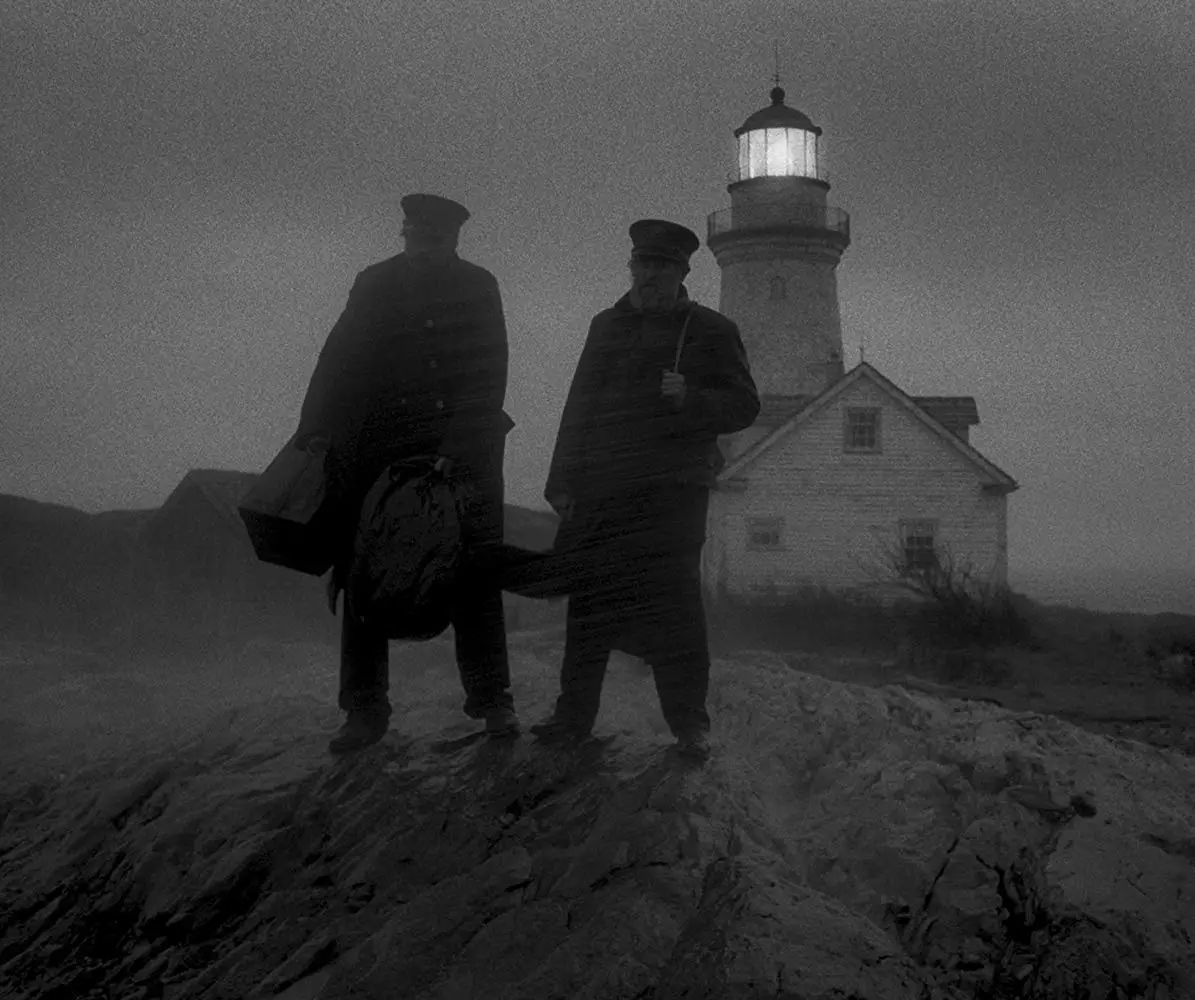Upon the brief opening credits, the setting of The Lighthouse reveals itself in every sensory detail. A steaming dark steel keel is cutting through rough waters in a monochromatic ocean fog painted by boxy black-and-white cinematography. An unnamed rocky island appears out of layers of mist. The ambient sounds of the surf pounding against the shore and a deafening foghorn announce its presence while the white beam from its titular structure slashes through precipitation and clouds above. As the boat draws closer and two men disembark to remain, the noises become shriller with the enveloping cries of seagulls and introduction of musical cues from the score.

Nothing about this place, its natural topography or its man-made constructs, looks, sounds, or feels comely. The disquiet is palpable. All the atmosphere is there in Robert Egger’s torturous and pin-pricking thriller. The unfortunate struggle is that the suspense ends there with the surface senses. There is not enough compelling story, mystery, or perversion to fill or overwhelm this eerie environment.
Quite the contrary, the two central characters are indeed overwhelmed. Willem Dafoe plays the elder veteran lighthouse keeper Thomas Wake. Filled with Dafoe’s gruff zeal and ever-present twitch, Thomas is a salty dog dripping in alcohol-fueled admonishment. The recipient of his constant chiding is his subordinate mate Ephram Winslow, played by Robert Pattinson. The greenhorn maintains the grounds and resources while Thomas always mans the light itself.
There is mundanity in this isolation. Insisting on keeping a strict keeper’s log (historical examples of which informed much of the craggy jargon of this movie), Thomas saddles Ephram will all of the upkeep, from cleaning out pots of piss and excrement and maintaining the machinery to hopelessly painting the exterior with no Mr. Miyagi-level gain in skill or standing. The routines are beyond monotonous and the surly company makes much of Ephram’s time unbearable. That tedium is passed quite effectively to the viewer as well.
There is also madness in this isolation. Even the most virile and virtuous man has his thresholds stuck in a situation like that. With each passing day of confinement and repetitive errands, Ephram’s sober and stolid will burns into fiery contempt. His mind races and his sleep fills with nightmarish voices and flashes ranging from tempting beached mermaids to tentacled monstrosities. This solitude is far from serene. Diatribes turn into fights.
The two leads commit to the rambunctious rawness necessary to immerse these characters into their hellacious psyches. Robert Pattinson takes his explosive outbursts to a new level. His cracks are like earthquake faults, especially when played against the lobotomy drill that is Willem Dafoe. To watch them degrade and devolve is minorly impressive. Their escalating performances are the sole reason to watch this picture beyond that acidic aura created by the production value from many of Eggers’ previous collaborators from The Witch.
The rigorous Nova Scotia location lends itself to the cinematic absorption of cinematographer Jarin Blaschke seeking every rough-hewn texture. The 1.19:1 framing is impeccable and the close-up shots reveal additional seediness when the threats are not looming from a CGI-assisted distance. Composer Mark Korven pierces high flutes into the score to mirror to natural growls. As complimented earlier, the sound mix of all the elements concocted by designers Mariusz Glabinski and Damian Volpe is extraordinary. Again, all of that is an atmosphere with limits.
The Lighthouse is more mundanity than madness, which is surprising given the pedigree involved. It is odd to say that a Robert Eggers film is not sinister or disturbing enough but the boredom outweighs the suspense at each and every turn. Mere flickers are all that transpire before you, which leaves you wanting more oddity and, frankly, broader vision. All of the portending, however attuned it is to its sense of art, registers as pretentious.
To give this a fitting seafaring analogy, The Lighthouse is like eating a luxurious crab. The film looks the part on the plate as a grand dish. However, it requires fatiguing effort to enjoy. The meat may taste good, but there is too much shell and too much work to get at that puny succulence. The very pretty movie and meal then become lacking and negligible for satisfying sustenance. Pass the fish sticks or, better yet, some mermaid filets.




